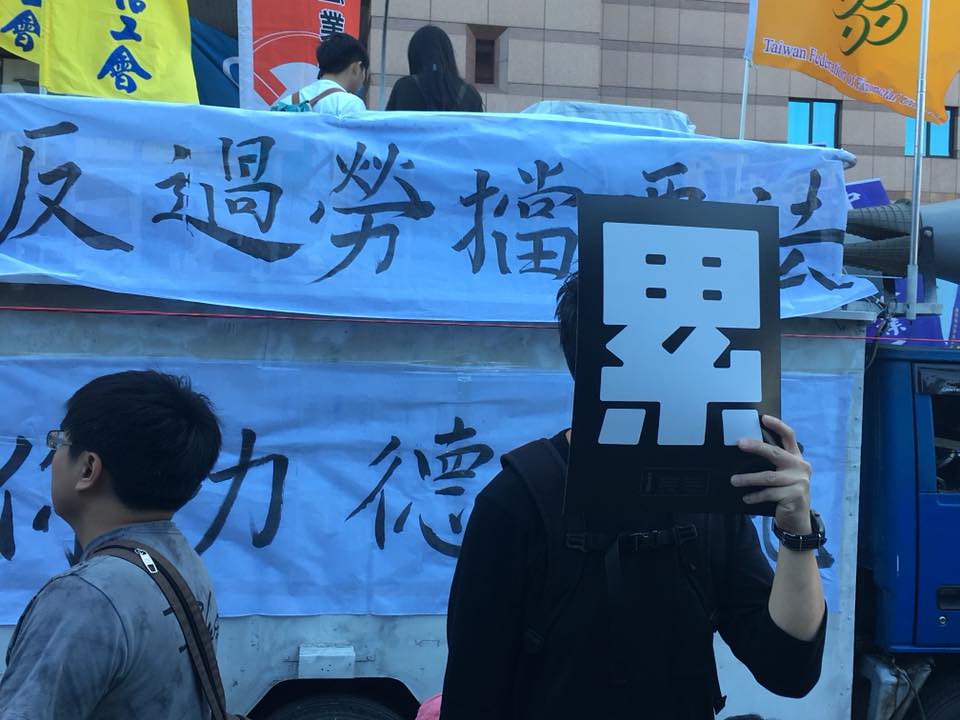
So, I pushed myself to go to today's labor protest even though I woke up this morning to the news that my grandfather had passed away (it was not a surprise).
Pushing myself to go anyway was a feat, but there is work to be done and I wanted to be one of the faces in that crowd helping to do it, even if all we were going to accomplish was media attention. After all, I live here and work here too and although the new labor laws don't affect me, Taiwan's generally terrible labor situation does affect me indirectly. Imagine, though, viewing a protest of roughly 10,000 people through a poorly-lit and echo-filled tunnel of unrelated personal grief.
I won't say that I went today as a journalist; I'm not one. I went as a demonstrator in a very conflicted state of mind who happened to plan to write about the experience.
I showed up just as the speeches were getting started and immediately grabbed one of the 'official' (in that everyone had one) protest placards. One side said "累" ("Tired") in Chinese, the other had a large graphic middle finger and said "終止過勞" ("End Overwork"). Almost every labor union I know - and some I didn't know existed - were there. Some were industry-related (e.g. the Taiwan Media Workers' Union), some business-specific (a Carrefour workers' union was present), some related to a specific kind of workers, such as foreign laborers who were quite noticeably present. Some, I noticed wryly, represented workers from government-run enterprises such as Taiwan Railways,
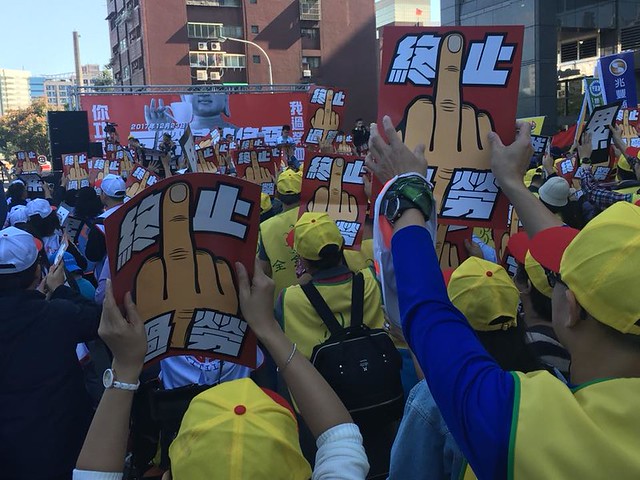
Also available were fake temple talismans on yellow paper, a reference to Premier Lai Ching-te saying that working hard for low wages was akin to earning "merit" (in the Buddhist/karma sense). Some people held placards showing a Pinocchio-like President Tsai, who is seen as having lied about the DPP's support for Taiwanese labor. Others held signs that looked like cassette tapes, a reference to a legislator saying all of the slogans being chanted outside were "on a tape" (something the pro-unification protesters - all 6 of them - regularly do) because the "real laborers were busy working hard at their jobs".
I didn't stay for the whole demonstration - which is actually still ongoing - but I stayed long enough to see some intense clashes between demonstrators and police over where the protest was "officially" allowed to be held. More on that later.
First of all, if there's any reason for hope, it's this: for the first time, foreign laborers were being brought into the fold and treated as equals alongside Taiwanese workers. They took the stage and had a translator (as the speaker used Bahasa Indonesia) relating their speech in Mandarin. For the first time that I'm aware of, labor from private and public industries came together, and had visible support from other social activist groups as well.
In fact, the Social Democratic Party, the Green Party, several marriage equality groups (including the Taiwan Tongzhi Hotline) and a Taiwan independence group holding signs saying "Fuck ROC" and passing out stickers saying "DPP KMT both are ROC", despite none of these issues being the main focus of the day.
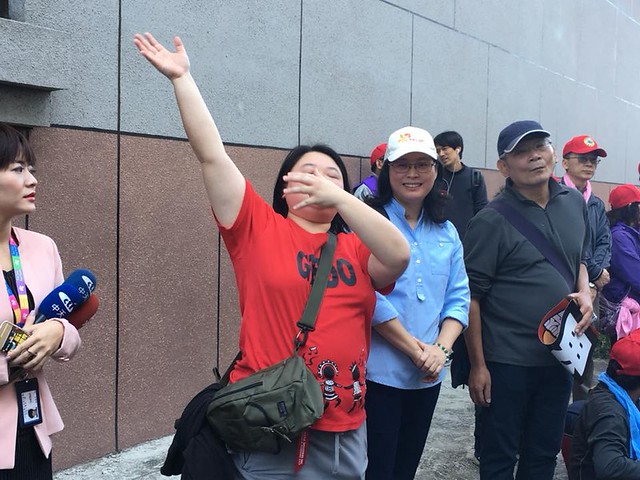 |
| Taipei Labor Bureau Commisioner Lai Hsiang-ling at the protest |
Along with the far left, the far right of the Taiwanese political scene was also there. Veterans showed up demanding the benefits they'd been promised, and at least one KMT legislator, Lee Yen-hsiu (李彥秀) was present giving interviews and generally pretending that the KMT gives a crap about labor (SPOILER ALERT: it doesn't). Apparently the NPP also declared its support, but oddly was not present. I fully intend to, um, inquire about this. Not cool, NPP.
This protest won't do much except garner media attention, but what I really hope comes of it is this - that these groups will continue to work together and turn labor issues into a major social movement with broad and active support. This sort of cross-pollination - marriage equality, Taiwan independence, migrant workers' rights, leftists and rightists, government workers and private-sector workers - is needed for a movement to gather momentum.
Several speeches, as well as several people I talked to in the crowd, noted that the DPP is no better than the KMT. While I do think people hold the DPP to a much higher standard than the KMT and that's not always fair - the KMT can get away with being supremely awful, and yet they're still around and still sometimes get elected whereas everyone jumps all over the tiniest slip by the DPP - that's to be expected when one party grew out of a mass-murdering dictatorship it doesn't seem too contrite for having perpetrated, and the other had idealistic roots based in freedom and democracy. You expect more from the people who claim to be better.
That said, on labor issues, and frankly on a lot of domestic issues, I have to say that they deserve the criticism. I'm generally happy with the way the DPP is handling China, but they're sure making a mess out of Taiwanese domestic issues, labor included. All I can really say is that they inherited a massive KMT mess to clean up, and the main problem is that they haven't got a clue how to do it. So they suffer for their own mistakes - which is well-deserved punishment - as well as the KMT's, which isn't.
Remember, we wouldn't even be in this labor mess if the KMT had given a damn about labor during their many, many, many, many years in power.
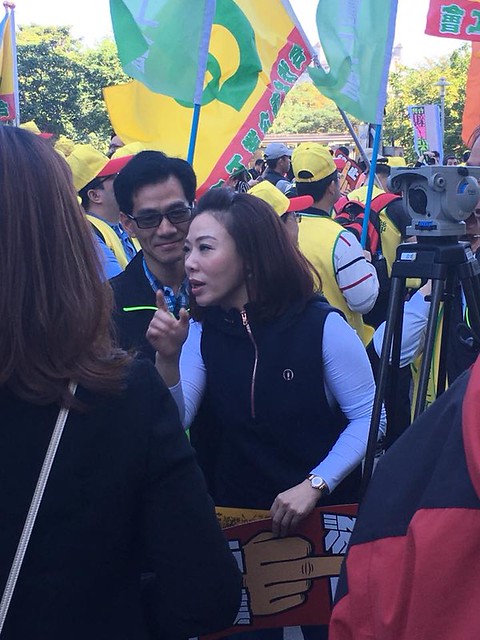 |
| KMT legislator Lee Yan-xiu at the protest |
In fact, I wonder if this is why the NPP - which seems pro-dual-nationality for (some) foreign professionals, but is not in favor of relaxing restrictions on foreign professionals and certainly not a great friend to foreign blue-collar labor - didn't show. Hmm. NPP, I luv you guyz, but come on. You're losing me here.
In any case, two things I noticed about foreign laborers at the rally: first, that they mostly wore surgical masks (unlike most Taiwanese workers there) because they were afraid of being identified and fired, a point explicitly made in their speech. Second, that while Taiwanese workers were fighting to have fair labor laws, the foreign workers were in some cases fighting to have the labor laws apply to them at all: many of those present held signs demanding that foreign care workers be included under Taiwanese labor protections, which they currently are not.
The airline, telecom and railway workers also interested me: as they pointed out in their speeches, their bosses are the government, and yet these new labor laws will screw them over, too.
Not everyone in the government is blind to this: the Taipei City Labor Bureau commissioner, Lai Hsiang-ling (賴香伶) marched with protesters in solidarity.
After listening to all of these speeches and chanting the usual anti-government slogans, we walked from DPP headquarters to what we thought was going to be the Legislative Yuan. On the way, I saw a marriage equality sign that said (in Chinese) "We can't get married but no matter - home, life, all not given". I quipped to a friend, "I'm surprised nobody has a sign that says "the birthrate is so low because nobody has time to fuck!" He replied that, in fact, someone on stage had said that (I missed it - I miss a lot, what can I say) but there was no sign. Too bad.
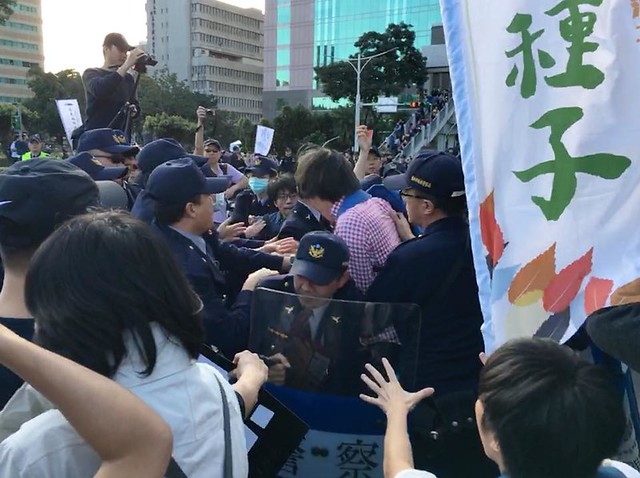 |
| Clashes with police |
I noticed something I hadn't seen before - though it is possible they have always been there and I just hadn't taken note: police cameras. Every few yards, one of the police officers watching the march was filming it.
When we hit Zhongshan and Zhongxiao Roads, however, a line of police appeared and would not let us continue up Zhongshan - trying to force the crowd to instead walk west, past Taipei Main Station. Organizers asked the crowd not to do that, as the route they'd applied for had them going up Zhongshan Road, whereas the police said they were not allowed.
There are conflicting reports of what exactly happened: the organizers were saying that the police were blocking an intersection that they had been approved to march through, with some commenting that this was to create conflict. Others say that the police announced the protest violated the Parade and Assembly Act and that was the reason for the blockade. Some say this was a ruse to simply stop the protest, as there was a possible intention to storm the Legislative Yuan (again...I suppose).
I don't buy either of these. Why would the police want to create conflict? Peaceful protests can be - and usually are - ignored. Protests that end in brawls grab media attention. Why do you think the KMT did exactly nothing to stop - nor to answer the demands of or even acknowledge - the old DPP-led protests during the Ma administration?
In terms of the second, with legislators and high-profile government employees there, and with it having been all over Facebook for weeks, there is no way this march "violated" any laws. Come on.
In any case, the protesters started chanting "police let us through!" and several intense clashes broke out, though nobody appeared to be seriously hurt (I was right there for one of them).
Finally, the police gave way after several attempts to push through, and the intersection - one of Taipei's largest and busiest - was occupied.
Here's my pet theory as to what happened:
By virtue of it being at Zhongshan and Zhongxiao Roads, the protest stopped outside of the Executive, not Legislative, Yuan. Apparently - according to a friend - a meeting was being held in there at that time. In any case, it was so heavily blockaded and surrounded with barricades and barbed wire that there was a clear government fear of an attempt to storm it.
UPDATE: the forced move into the intersection was, according to one of the organizers, an intentional move by the rights groups to start a conflict.
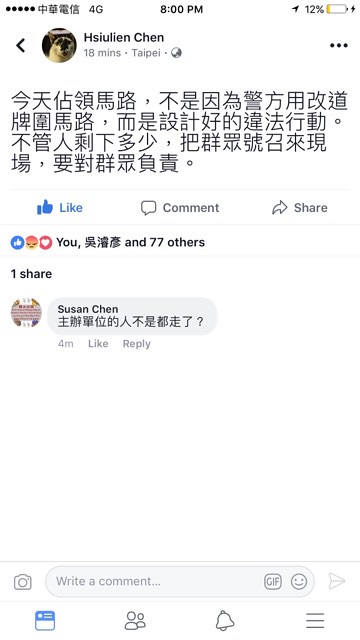
What resulted was an occupation of a major intersection - garnering more media attention than any of the previous labor protests, possibly the most since the 200,000-strong marriage equality rally - that is still ongoing. There are still clashes with police as people attempt to storm the Executive Yuan (see?) and apparently the police, according to a friend, are starting to look 'ready'.
I left around 4pm, because frankly, I lost my grandpa this morning. It was time to go and take care of my own headspace.
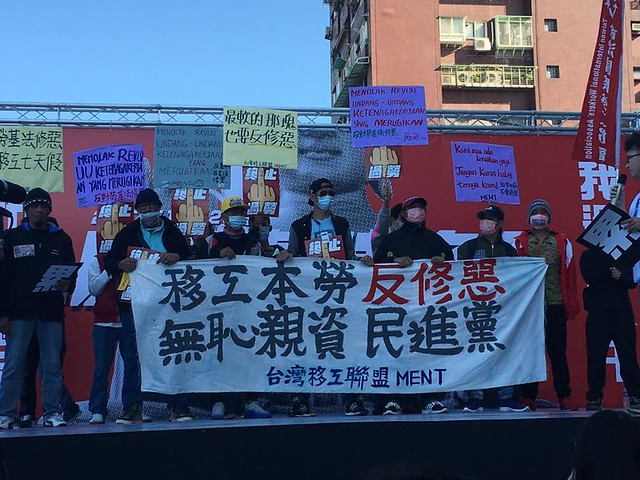 |
| Migrant workers are afraid to show their faces for fear of retribution from their employers |
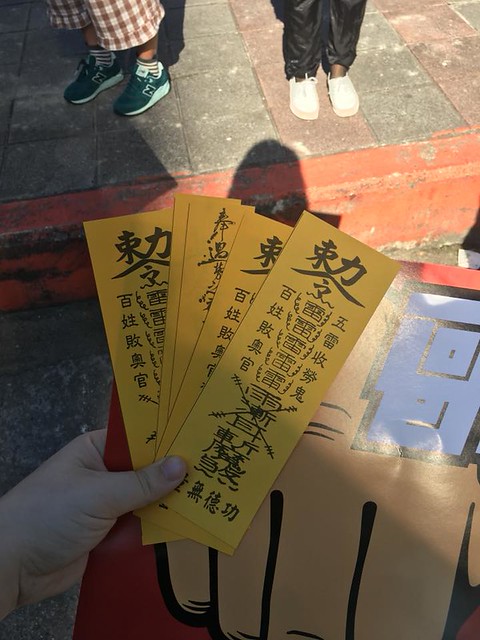 |
| Fake temple talismans mocking Premier Lai's comment about low pay earning "merit" |
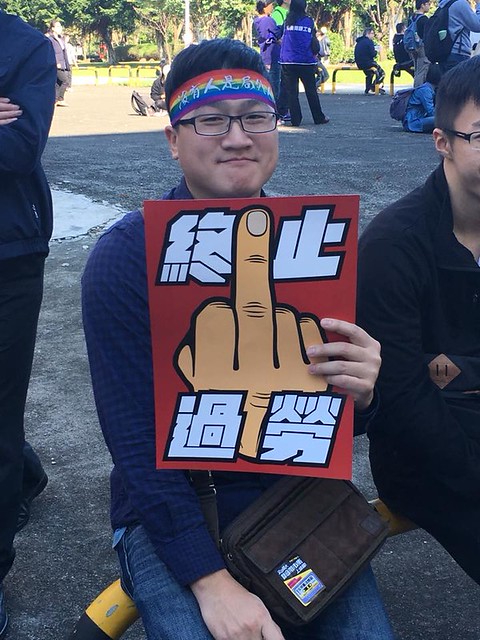
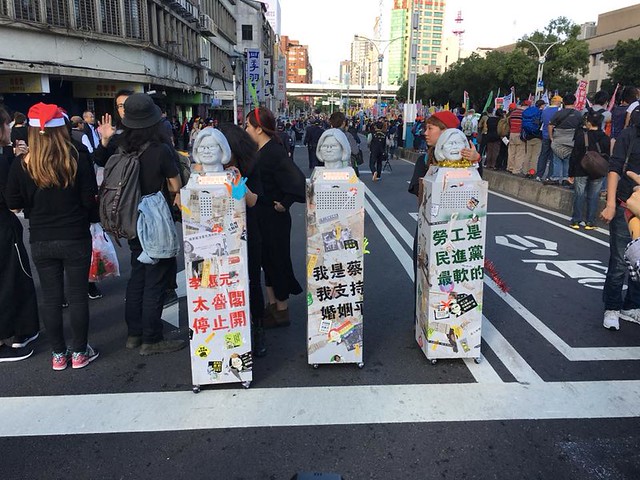 |
| "You can abuse President Tsai!" the people who set these up told me helpfully. She makes noise if you slap her. |
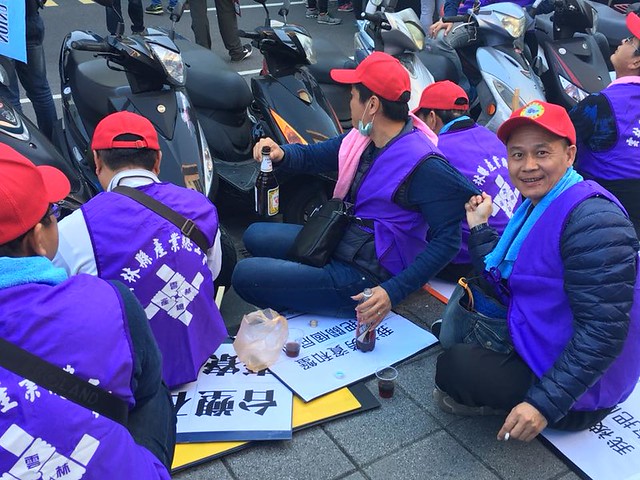 |
| Is there anything more Taiwanese than a bunch of workers in nylon vests drinking Wisbih (or is it Man Niu?) at a protest? |
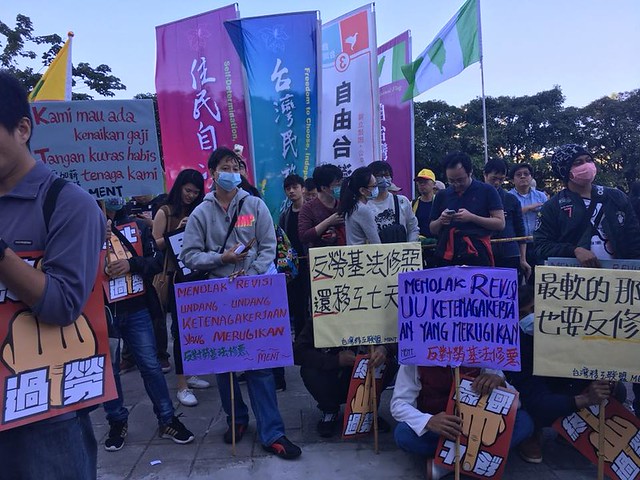 |
| More migrant workers |
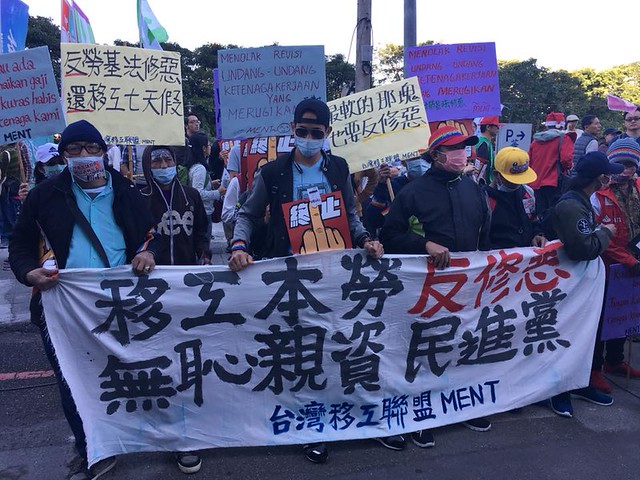
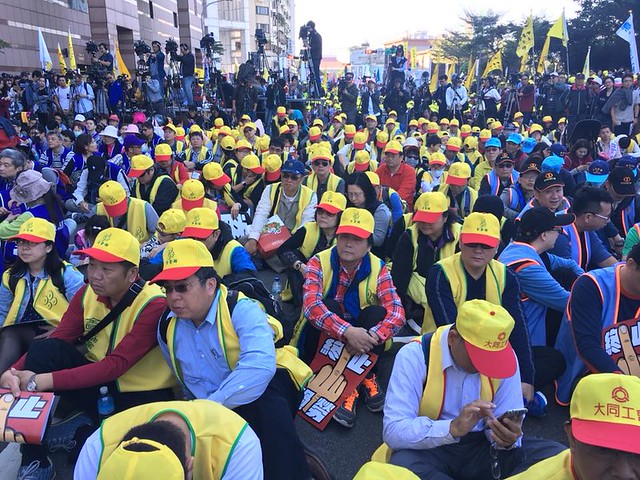
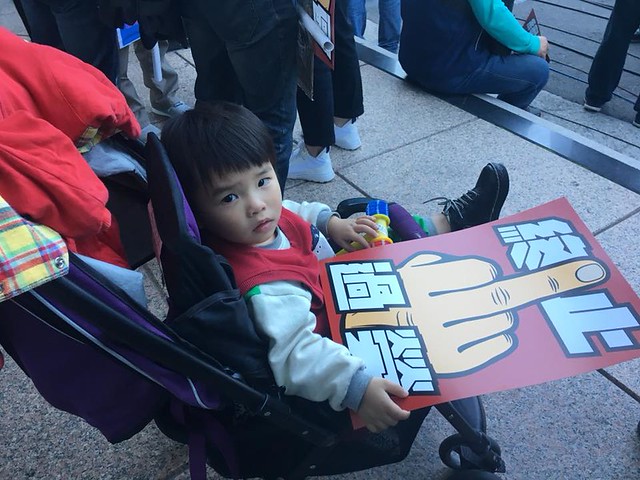 |
| Although there were kids at the protest, I got the feeling it was much angrier and more visceral than typical family-friendly Taiwanese demonstrations |
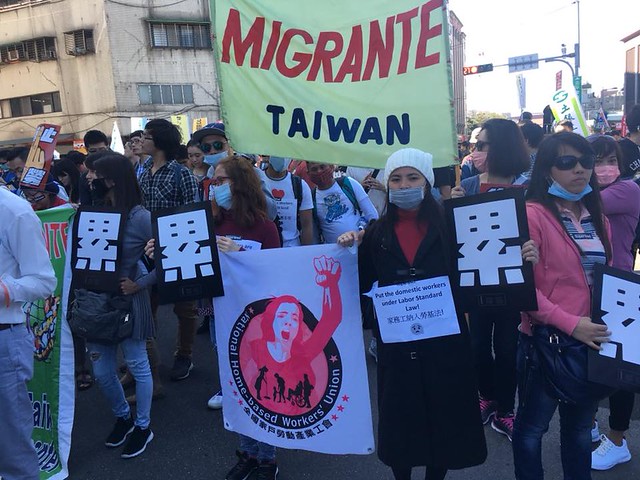
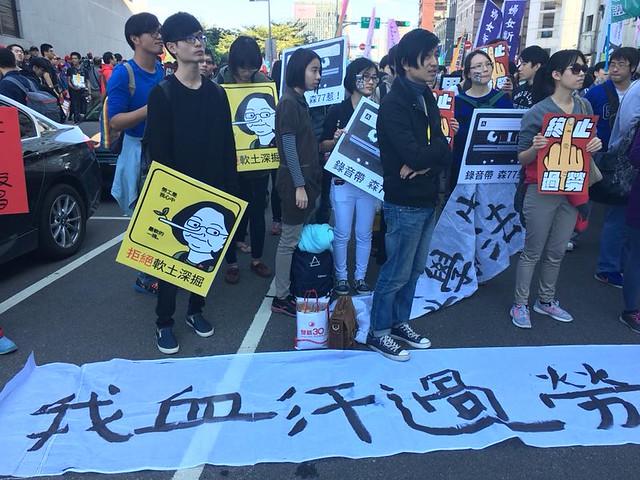
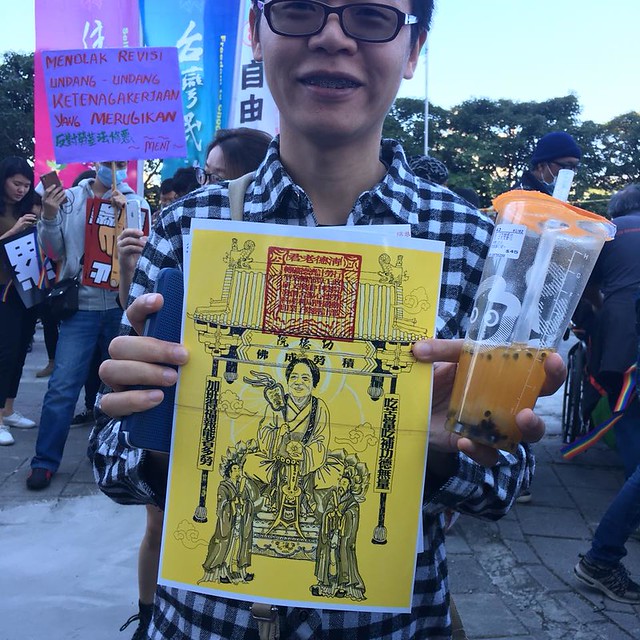
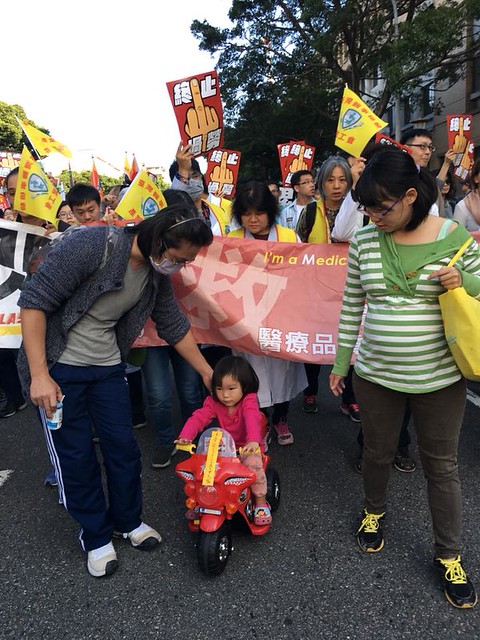
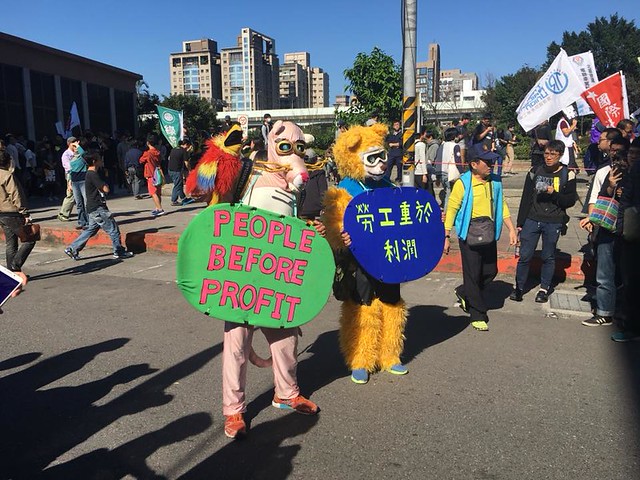 |
| My favorite protesters, every time |
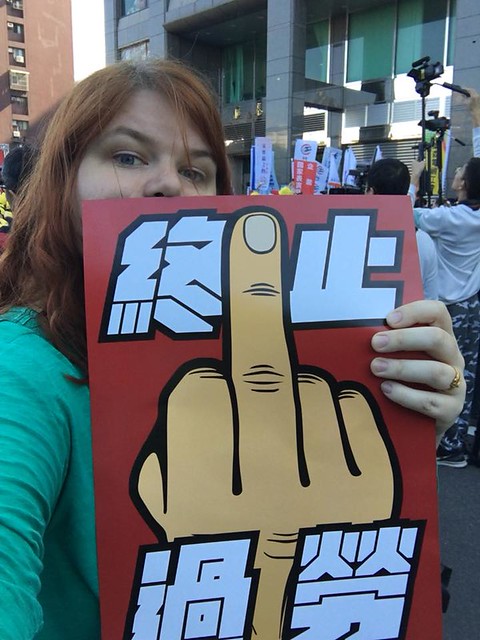
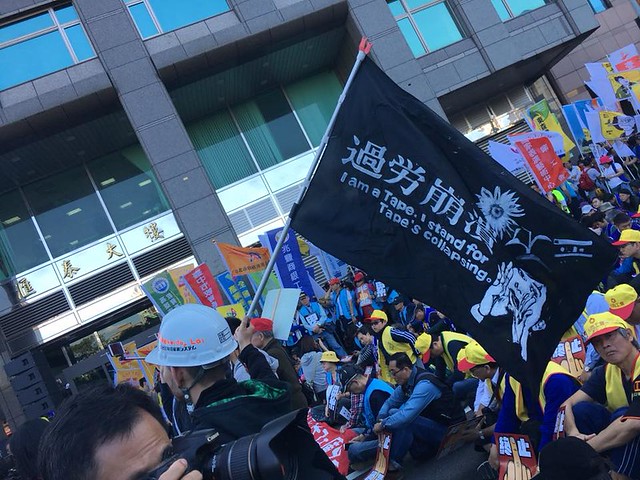
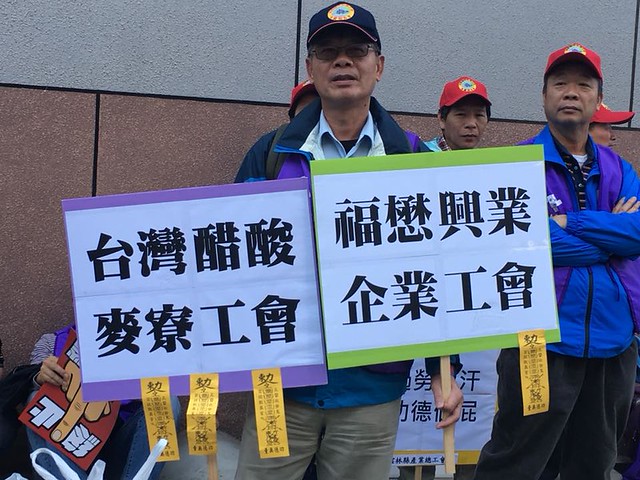
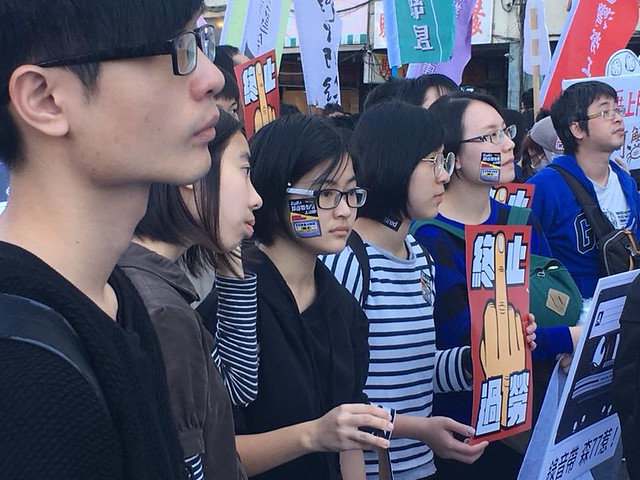
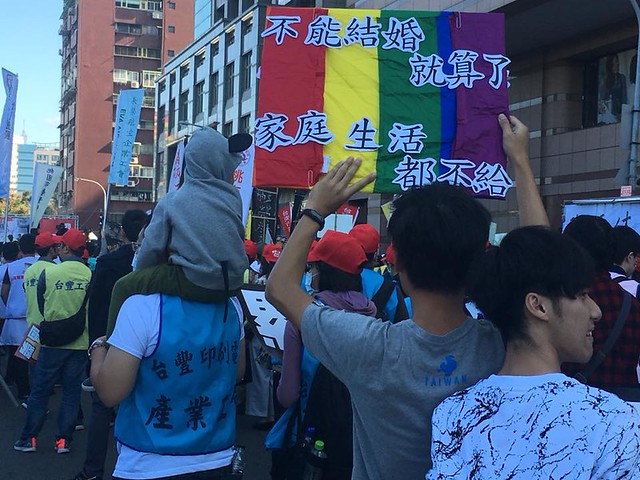
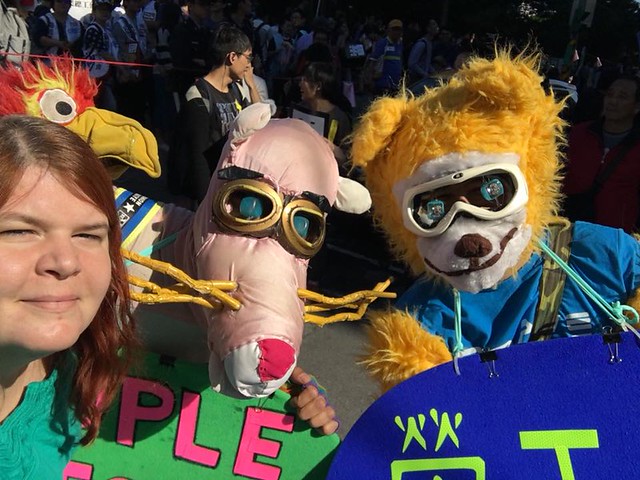
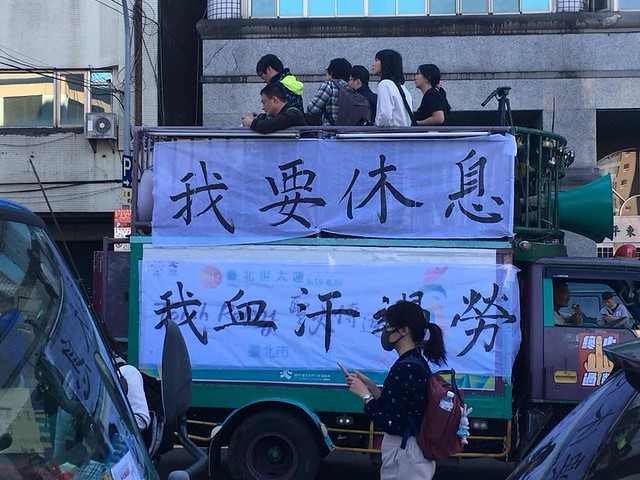
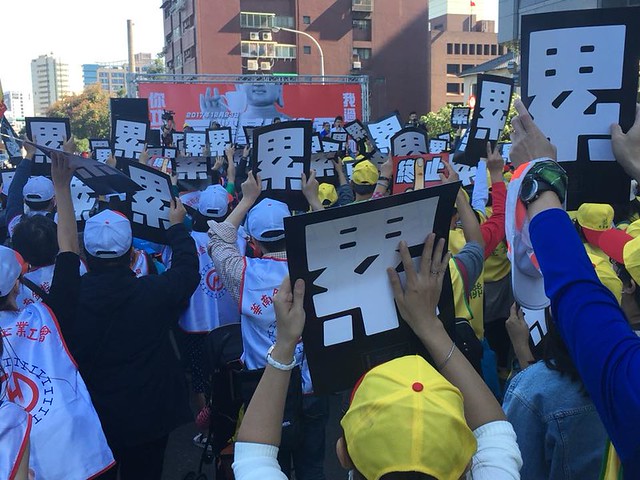
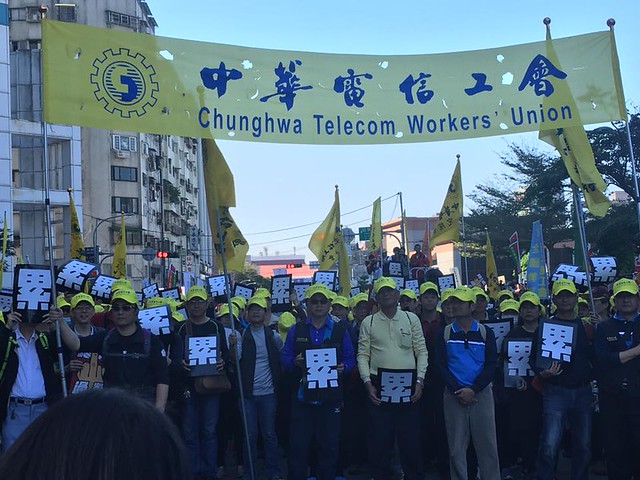 |
| Even government workers are upset |
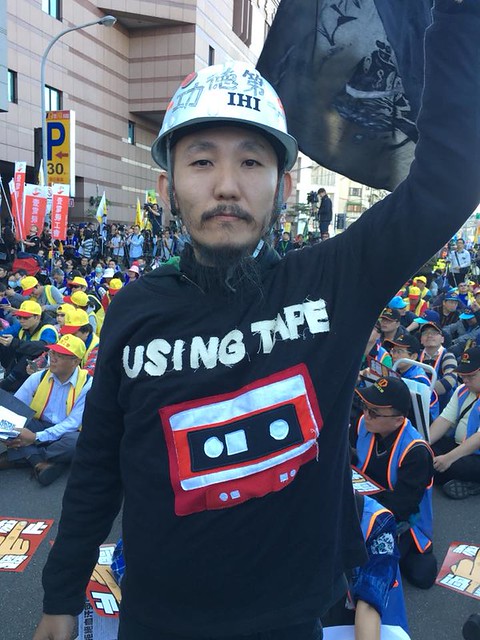 |
| A reference to the "the slogans are taped" comment by one legislator |
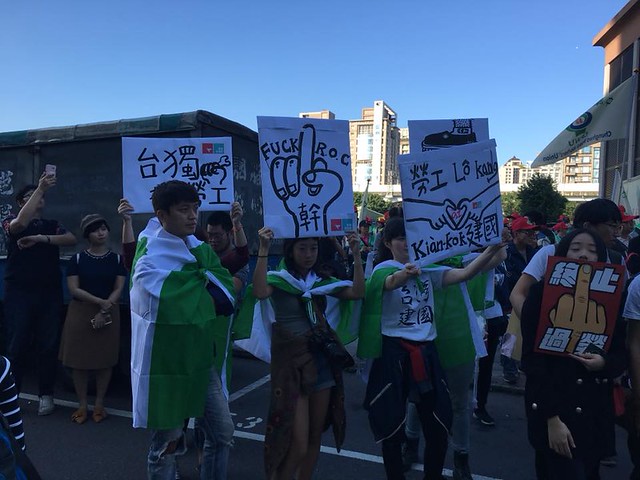 |
| Lots of different groups came together |

Thanks for the reporting! I was there also before the whole group started to march on... I'll come say hi at the next demonstration! ;)
ReplyDeleteI'm not sure I understand your position towards the DPP, but this last year made it clear to me: none of the major political parties in Taiwan care for the labor class. None of them understand that behind every company, sure there is a boss, but there are hundreds of thousands of employees. None of them understand that the well-being of the population is the most important.
Both DPP and KMT are money-hungry neoliberals. I had a few hopes after Tsai Ing-Wen was elected, but look at who she selected to become the prime minister... William Lai, a guy who looks down at workers, who suggest that workers should go to work on typhoon days... This is clearly a big "Fuck you, workers!" message sent by Tsai and her administration.
To be honest, I'm not even sure about the NPP for that matter. Let's wait and see, I guess!
Essentially, I don't like the way the DPP is handling domestic issues, but I am either OK with or fully in support of their foreign policy. (OK with = New Southbound Policy. I'm not more enthusiastic only because I don't see it delivering many results. Fully in support: how they handle China. I'd love for them to be more aggressive towards China, tell China to really stick it, but that's a personal preference - I just don't think it's actually wise to do so. The way they are going about it is much more appropriate to the situation).
ReplyDeleteDomestically, they're making a mess, labor included. They're probably weakest on labor at this point but have also not been great on power, water (is nobody interested in Taiwan's perpetual water shortage?) and marriage equality. They show no interest in making small but important reforms such as covering birth control under NHI. I am not happy so far.
That said, I have to admit a lot of the problems leading to a weak DPP showing on domestic issues were originally the fault of the KMT. Remember, before Tsai the DPP only held power for 8 years, and did not hold both the presidency and the legislature, so most of the problems that are most deeply rooted are originally KMT problems. The water shortages, the power issues - both problems the KMT created. Shitty infrastructure - that's KMT work. Labor? Well, the KMT has never cared about labor. Marriage equality? That issue cuts more across party lines (not enough though) but is too 'new' in the Taiwanese mainstream, so I see it as kind of an outlier. Everything else? The DPP inherited the KMT's mess.
So the DPP is being criticized 1.) For not immediately solving the problems the KMT created (which is unfair - nobody could do that) and also 2.) Not being great on these issues themselves (which is fair - they deserve the criticism).
On top of that, people just expect the KMT to be shit, so when they are shit, well, they just lived up to expectations. They expect more from the DPP as their party has more idealistic origins. So when the DPP is shit the criticism is much more vicious - when the KMT is just as bad...hardly a peep. I'm talking about criticism from the mainstream of course.
So, while not a huge fan of the DPP on domestic issues, I do recognize they are often the victim of expectations that are set a lot higher than those set for the KMT.
Does that make sense? It's a position with many different angles. I don't entirely hate them but I don't like them much either.
The NPP...a lot of people thought of them as political saviors. They ain't. They tend to have platforms that reflect my beliefs so I support them, but they are far from perfect. I do not always agree with them, and I do not think they are political geniuses who will make everything right with Taiwan. They could well fail, and even if they don't, nobody can make *everything* right.